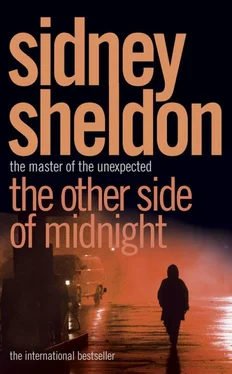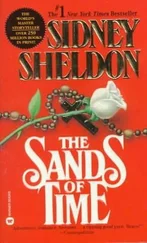‘There is nothing you can do for her now, Israel.’
Perhaps she was right, but Noelle Page had once risked her life to save his and he owed her something. He thought of Noelle now, and he felt the same indescribable feeling that he had felt whenever he had been with her. It was as though the mere memory of her could dissipate the years that separated them. It was romantic fantasy, of course. Nothing could ever bring those years back. Dr Israel Katz felt the plane shudder as the wheels were lowered and it started its descent. He looked out the window and spread out below him was Cairo, where he would transfer to a TAE plane to Athens, and Noelle. Was she guilty of murder? As the plane headed for the runway he thought about the other terrible murder she had committed in Paris.
Philippe Sorel stood at the railing of his yacht watching the harbour of Piraeus moving closer. He had enjoyed the sea voyage because it was one of the rare opportunities he had to escape from his fans. Sorel was one of the few sure box-office attractions in the world, and yet the odds against his ever rising to stardom had been tremendous. He was not a handsome man. On the contrary. He had the face of a boxer who had lost his last dozen matches, his nose had been broken several times, his hair was thin and he walked with a slight limp. None of these things mattered, for Philippe Sorel had sex appeal. He was an educated, soft-spoken man, and the combination of his innate gentleness and truck-driver’s face and body drove the women frantic and made men look up to him as a hero. Now as his yacht approached the harbour, Sorel wondered again what he was doing here. He had postponed a movie that he had wanted to make in order to attend Noelle’s trial. He was only too well aware of what an easy target he would be for the press as he sat in the courtroom every day, completely unprotected by his press agents and managers. The reporters were certain to misunderstand his attendance and think that it was a bid to reap publicity from the murder trial of his former mistress. Any way he looked at it, it was going to be an agonizing experience, but Sorel had to see Noelle again, had to find out if there was some way in which he could help her. As the yacht began to slide into the white-stoned breakwater of the harbour, he thought about the Noelle he had known, lived with and loved, and he came to a conclusion: Noelle was perfectly capable of murder.
As Philippe Sorel’s yacht was approaching the coast of Greece, the Special Assistant to the President of the United States was in a Pan American Clipper, one hundred air miles northwest of the Hellenikon Airport. William Fraser was in his fifties, a handsome grey-haired man with a craggy face and an authoritative manner. He was staring at a brief in his hand, but he had not turned a page or stirred for more than an hour. Fraser had taken a leave of absence to make this journey, even though it had come at a most inconvenient time, in the midst of a congressional crisis. He knew how painful the next few weeks were going to be for him, and yet he felt that he had no choice. This was a journey of vengeance, and the thought filled Fraser with a cold satisfaction. Deliberately Fraser forced his thoughts away from the trial that would begin tomorrow and looked out the window of the plane. Far below he could see an excursion boat bobbing its way towards Greece, its coast looming in the distance.
Auguste Lanchon had been seasick and terrified for three days. He was seasick because the excursion boat which he had boarded in Marseille had been caught in the tail end of a mistral, and he was terrified because he was afraid that his wife would find out what he was doing. Auguste Lanchon was in his sixties, a fat, bald-headed man with small stumpy legs and a pockmarked face with porcine eyes and thin lips that constantly had a cheap cigar clamped between them. Lanchon owned a dress shop in Marseille and he could not afford – or at least that is what he constantly told his wife – to take a vacation like rich people. Of course, he reminded himself, this was not truly a vacation. He had to see his darling Noelle once again. In the years since she had left him, Lanchon had followed her career avidly in the gossip columns, in newspapers and magazines. When she had starred in her first play, he had taken the train all the way to Paris to see her, but Noelle’s stupid secretary had kept them apart. Later he had watched Noelle’s movies, seeing them again and again and remembering how she had once made love to him. Yes, this trip would be expensive, but Auguste Lanchon knew that it would be worth every sou of it. His precious Noelle would remember the good times they used to have together, and she would turn to him for protection. He would bribe a judge or some other official – if it did not cost too much – and Noelle would be freed, and he would set her up in a little apartment in Marseille where she would always be available to him when he wanted her.
If only his wife did not find out what he was doing.
In the city of Athens Frederick Stavros was working in his tiny law office on the second floor of an old run-down building in the poor Monastiraki section of the city. Stavros was an intense young man, eager and ambitious, struggling to make a living from his chosen profession. Because he could not afford an assistant, he was forced to do all the tedious background legal research himself. Ordinarily he hated this part of his work, but this time he did not mind because he knew that if he won this case his services would be in such demand that he would never have to worry again for the rest of his life. He and Elena could be married and begin to raise a family. He would move into a suite of luxurious offices, hire law clerks and join a fashionable club like the Athenee Lesky, where one met affluent potential clients. The metamorphosis had already begun. Every time Frederick Stavros walked out into the streets of Athens, he was recognized and stopped by someone who had seen his picture in the newspaper. In a few short weeks he had jumped from anonymity to the attorney who was defending Larry Douglas. In the privacy of his soul Stavros admitted to himself that he had the wrong client. He would have preferred to be defending the glamorous Noelle Page instead of a nonentity like Larry Douglas, but he himself was a nonentity. It was enough that he, Frederick Stavros, was a major participant in the most sensational murder case of the century. If the accused were acquitted, there would be enough glory for everyone. There was only one thing that plagued Stavros, and he thought about it constantly. Both defendants were charged with the same crime, but another attorney was defending Noelle Page. If Noelle Page was found innocent, and Larry Douglas was convicted … Stavros shuddered and tried not to think about it. The reporters kept asking him whether he thought the defendants were guilty. He smiled to himself at their naïveté. What did it matter whether they were guilty or innocent? They were entitled to the best legal defence that money could buy. In his case he admitted that the definition was stretched a bit. But in the case of Noelle Page’s lawyer … ah, that was something else again. Napoleon Chotas had undertaken her defence, and there was no more brilliant criminal lawyer in the world. Chotas had never lost an important case. As he thought about that, Frederick Stavros smiled to himself. He would not have admitted it to anyone, but he was planning to ride to victory on Napoleon Chotas’ talent.
While Frederick Stavros was toiling in his dingy law office, Napoleon Chotas was attending a black-tie dinner party at a luxurious home in the fashionable Kolonaki section of Athens. Chotas was a thin, emaciated-looking man with the large, sad eyes of a bloodhound in a corrugated face. He concealed a brilliant, incisive brain behind a mild, vaguely baffled manner. Now toying with his dessert, Chotas sat, preoccupied, thinking about the trial that would begin tomorrow. Most of the conversation that evening had centred around the forthcoming trial. The discussion had been a general one, for the guests were too discreet to ask him direct questions. But towards the end of the evening as the ouzo and brandy flowed more freely, the hostess asked, ‘Tell us, do you think they are guilty?’
Читать дальше











